 1 citations,
June 2001 in “Annals of Internal Medicine”
1 citations,
June 2001 in “Annals of Internal Medicine” The document concludes that there is no credible evidence that distant healing works, and it should not be further studied in medical literature.
 1 citations,
January 2001 in “Dermatologic Surgery”
1 citations,
January 2001 in “Dermatologic Surgery” Pulsed dye laser and hydrogel dressings effectively treat hypertrophic scars.
 1 citations,
November 1994 in “JAMA”
1 citations,
November 1994 in “JAMA” The document praises a resource on hair growth disorders and recognizes a reference on blood diseases' molecular aspects as authoritative.
 1 citations,
April 1987 in “American Journal of Nursing”
1 citations,
April 1987 in “American Journal of Nursing” Some drugs can cause serious side effects, like hypoglycemia from mix-ups, skin reactions, or depression, and while penicillamine may help rheumatoid arthritis more than auranofin, it has more severe side effects.
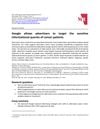
Google should ban ads targeting cancer patients with sensitive health-related keywords to protect them from misleading information.

Photobiomodulation improves the quality of life for people with hair loss.
 June 2024 in “Archives of Dermatological Research”
June 2024 in “Archives of Dermatological Research” SFRP2 and PTGDS may be key factors in female hair loss.
 May 2024 in “International journal of research in dermatology”
May 2024 in “International journal of research in dermatology” Low vitamin D levels are linked to increased risk of male pattern baldness.
 April 2024 in “International journal of women's health”
April 2024 in “International journal of women's health” Adult female acne is a complex condition that can worsen with menopause, requiring holistic treatment and tailored skincare at different life stages.
 March 2024 in “Research Square (Research Square)”
March 2024 in “Research Square (Research Square)” Combining genetic and physical trait analysis improves diagnosis accuracy for monogenic diabetes.
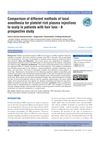 March 2024 in “Asian journal of medical sciences”
March 2024 in “Asian journal of medical sciences” Ring block anesthesia is the best method for PRP scalp injections due to low pain and high patient acceptance.
 February 2024 in “Frontiers in physiology”
February 2024 in “Frontiers in physiology” Modifying certain signals in the body can help wounds heal without scars and regrow hair.
 February 2024 in “International Journal of Progressive Research in Engineering Management and Science”
February 2024 in “International Journal of Progressive Research in Engineering Management and Science” The herbal shampoo is safe, effective, and helps treat hair loss.
 January 2024 in “La Ciencia al Servicio de la Salud y Nutrición”
January 2024 in “La Ciencia al Servicio de la Salud y Nutrición” Spironolactone is effective and safe for treating hair loss, excessive hair growth, and acne.
 January 2024 in “Wiadomości Lekarskie”
January 2024 in “Wiadomości Lekarskie” Robotic hair transplantation with AI offers more reliable, precise, and efficient hair restoration.
 December 2023 in “Malahayati International Journal of Nursing and Health Science”
December 2023 in “Malahayati International Journal of Nursing and Health Science” Chemotherapy in children often causes hair loss, nausea, vomiting, and mood swings.
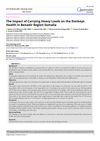 December 2023 in “Veterinary medicine. Open journal”
December 2023 in “Veterinary medicine. Open journal” Carrying heavy loads harms donkeys' health, causing pain and injuries.
 December 2023 in “International Journal of Medical Arts”
December 2023 in “International Journal of Medical Arts” Transplanted hair follicles show significant changes after FUE, needing more research.
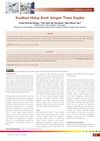 November 2023 in “Cermin Dunia Kedokteran”
November 2023 in “Cermin Dunia Kedokteran” Tinea capitis can affect mental health, but treatment improves both health and well-being.
 October 2023 in “Biomedical science and engineering”
October 2023 in “Biomedical science and engineering” Innovative methods are reducing animal testing and improving biomedical research.
 October 2023 in “Paediatrics & child health”
October 2023 in “Paediatrics & child health” The document advises health care providers on how to support transgender and gender-diverse youth with appropriate care and referrals.

Continuous research and innovative strategies are essential for sustainable development.

The conference emphasized innovative solutions for global challenges, including disaster architecture, education, health, and economic impacts.
 September 2023 in “Medical and Clinical Case Reports”
September 2023 in “Medical and Clinical Case Reports” People with Alopecia Areata often have thyroid problems like Hashimoto thyroiditis and hypothyroidism.
 August 2023 in “Research Square (Research Square)”
August 2023 in “Research Square (Research Square)” Two microRNAs affect hair follicle development in sheep by targeting specific genes.
 November 2022 in “Research Square (Research Square)”
November 2022 in “Research Square (Research Square)” Keratin-associated proteins have ancient origins and were used for different purposes before being adapted for hair in mammals.
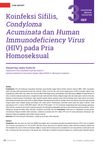 August 2022 in “MEDICINUS”
August 2022 in “MEDICINUS” A 22-year-old homosexual man was diagnosed with secondary syphilis, genital warts, and HIV, highlighting the high STI risk in men who have sex with men.
 July 2022 in “medRxiv (Cold Spring Harbor Laboratory)”
July 2022 in “medRxiv (Cold Spring Harbor Laboratory)” Satoyoshi syndrome is likely an autoimmune disease that mainly affects young women and improves with immune-related treatments.

The document concludes that the development of certain tumors is influenced by genetic background and that a specific gene modification can lead to tumor regression and reduced growth.
 February 2022 in “International journal of KIU”
February 2022 in “International journal of KIU” Certain genes and nutrients like vitamin D, zinc, and omega fatty acids affect COVID-19 severity and infection risk.






























